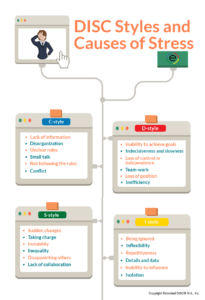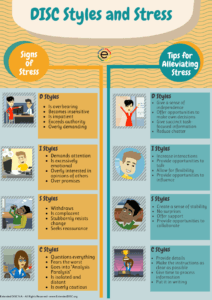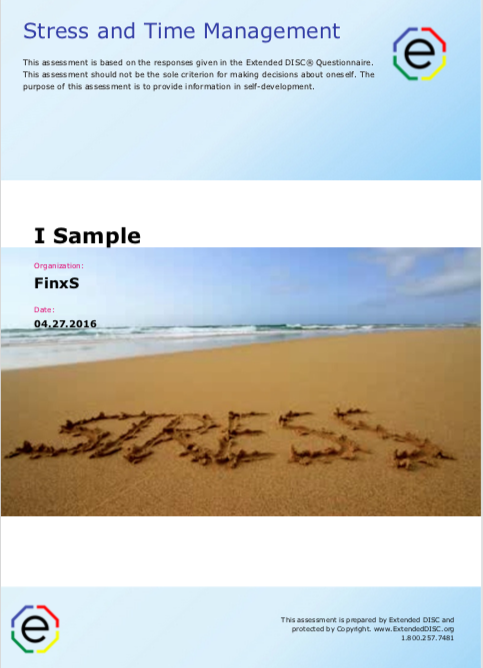On a daily basis, how often do you think your team members feel stressed?
We’re pretty sure most people would answer, “often.” Stress occurs when we feel forced outside of our comfort zones. Our bodies have normal biological reactions to the demands of our environment, but we become stressed when we feel those demands are constant and overwhelming. It drains our energy. Although, having a certain level of stress can boost our energy and motivate us.
Who’s stressed?
 We know that stress is a part of our daily lives, but how we react to it and manage it can mean the difference between failure and success. How can we help our team members better manage their stress? The DISC framework can help. The DISC tool helps identify our natural stressors and show how we are likely to show our stress. Once we recognize our stressors, we can find targeted ways to manage it.
We know that stress is a part of our daily lives, but how we react to it and manage it can mean the difference between failure and success. How can we help our team members better manage their stress? The DISC framework can help. The DISC tool helps identify our natural stressors and show how we are likely to show our stress. Once we recognize our stressors, we can find targeted ways to manage it.
Our DISC styles all have strengths and development areas. We have behavioral strengths so we should use them. Work is challenging enough, right? However we can overuse our strengths when we feel pressure or other strong emotions because we don’t have the energy to make adjustments. The overuse of our strengths can end up showing the negative aspects of our DISC styles and get us into trouble. For example, when an I-style feels overwhelmed, their normally optimistic and persuasive behaviors can suddenly change to over-selling and over-promising.
So how can DISC help us better manage stress in our team members?
How DISC can help us better manage stress
 Stress is a feeling of mental or emotional strain or tension, or when we feel pushed out of our behavioral comfort zone. There are different sources of stress, whether it’s financial burdens, relationships with bosses, or mounting deadlines. We lose our willingness and ability to modify our behaviors. We end up falling back on our natural style because we don’t have the energy and focus to adjust. This can further spiral out of control and impact our team. Therefore, we’re more likely to fail in our interactions if we are not prepared.
Stress is a feeling of mental or emotional strain or tension, or when we feel pushed out of our behavioral comfort zone. There are different sources of stress, whether it’s financial burdens, relationships with bosses, or mounting deadlines. We lose our willingness and ability to modify our behaviors. We end up falling back on our natural style because we don’t have the energy and focus to adjust. This can further spiral out of control and impact our team. Therefore, we’re more likely to fail in our interactions if we are not prepared.
DISC helps us build our situational awareness by identifying our common stressors and how we can alleviate them. Our DISC results are like a road map. They give us more information about our DISC behavioral preferences or how we prefer to do thing. For example, we are able to identify our stressors, our signs of stress, and what alleviates stress for us. We are then able to practice, or at least be more aware of, how to manage ourselves better in pressure situations.
Your team members have unique DISC styles; therefore, stress impacts your team members’ styles differently. Team members have different stressors, exhibit stress differently, and have different ways to manage it. Stress affects your team’s success and your bottom line. However, if stress is managed effectively, your team members will improve their performance.
Identifying your team member’s stress

We know we can’t avoid stress, but we can control how we respond to it and possibly even minimize it. Our awareness of our team members’ DISC styles and our own style helps us identify, prepare, and respond more effectively to stressors.
If your D-style team members feel they do not have control or they sense restrictions on their ability to focus on task, they may feel stressed. They can exceed authority, become insensitive, impatient, and demanding.
Your I-style team members may feel stressed when they lose influence, feel restricted, given an abundance of details, or ignored. Consider finding opportunities for them to move, meet people and interact. They can exhibit strong emotional opinions and worry overly much about others’ opinions. You can help them develop the skills to be more disciplined and organized, otherwise the stress will return quickly.
Your S-style team members find sudden changes, surprises, and unstructured situations to be stressful. S-styles They can seek reassurance, become overly cautious, or become stubbornly resistant to change. They are not likely to share their opinions and you may see them shut down where you can’t tell what they are feeling.
Your C-style team members are stressed if they lack accurate information, are in unclear roles, and do not have clear rules and guidelines to follow. They can feel anxious if they feel forced to make decisions based on intuition instead of proven and reliable information; increasing the chance of making the wrong decision. They can be nit-picky, focus on the negatives, refuse to deviate from the established protocols, and frozen when it comes to decision-making.
How you can help

Situational awareness, the act of taking a deep breath, or slowing down a little gives us more control over what is happening. These brief short-term adjustments may take us out of our comfort zone, which is stressful itself, but they can create practiced and successful responses to our stress.
Managers and co-workers can use DISC to recognize signs of stress and better understand what alleviates stress for our team members. We control our interaction, but we can’t control the other person. Therefore, we make brief adjustments that can help reduce stress for our team member. Can we give clearer instructions, build rapport and trust, or offer more opportunities to make independent decisions? DISC assessments provide guidelines to recognize each DISC style has its own unique relationship with stress and how we can help.
If we, as managers, can help our team members understand the relationship of their DISC styles and stress, then we have given them a powerful tool to achieving success. In recognizing each styles signs of stress, we can help determine more specific ways for each style to manage it.
Using the Extended DISC® Stress and Time Management Assessment

Technically, the stress we feel comes from how we react to a situation and not from the situation itself. This is why we have different reactions to the same situations. In fact, what may be a stressor for one, may not be for another. We need information. If we have information then we can better understand how each unique team member shows up and we can make better decisions to help.
Workplace stress is one of the main causes of unhappiness, dissatisfaction, and diminished mental health so we need all the tools we can get. The Extended DISC® Stress and Time Management Assessment is designed to help our team members improve their productivity and well-being by understanding their relationship to stress. The assessment focuses on specific areas including causes of stress, reactions to stress, signs of stress, and alleviating stress. As managers, we can also use it to help develop and support our team members. Watch our webinar, “Does the DISC-Style Play a Role in Employees’ Stress Levels” to learn how to use the assessment.
The fire drill

Our natural styles will likely show up if we are thrown into a pressure situation. We are less capable of adjusting our style because we’re dealing with the pressure. Do you recall any recent pressure situations, such as a disagreement during a team meeting or a heated discussion with a team member? Who got louder or became more emotional? Did someone simply some shut down or retreat to his or her office?
Next, consider the fire drill scene from the sitcom, The Office. Let’s say the fire alarm goes off in your department, and all escape routes appear to be cut off. Which of your team members are more likely to recite the fire drill protocol? Which ones will take charge? Who are more likely to be quiet and wait for instructions? Do we wait until we’re in trouble before we think about how deal with stress?
In the end, we are more likely to overuse our DISC style or display the negative traits of it when we are pressured and stressed. We know it doesn’t work efficiently so we need to figure out ways to manage it. DISC gives us insight into how our unique styles relate to stress. In addition, we can better understand each others’ stressors, signs of stress, and our options for managing it. DISC provides valuable information to anticipate and prepare for stressful situations, and end up with more successful outcomes.
